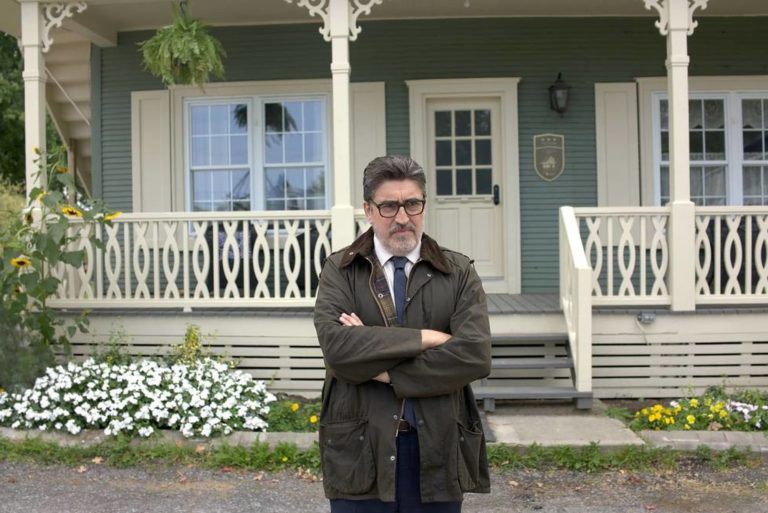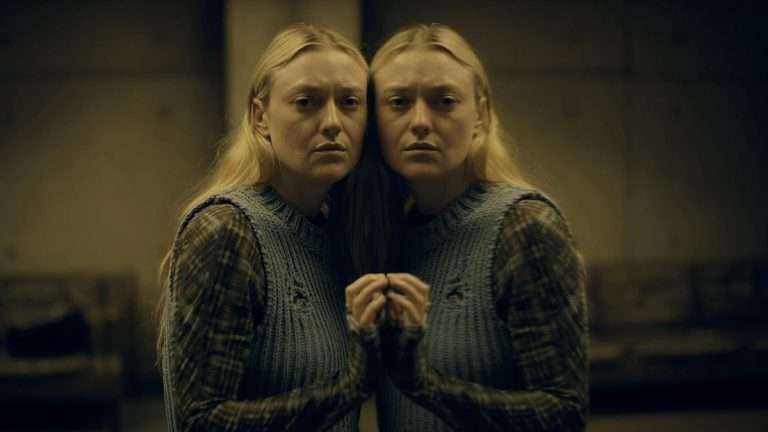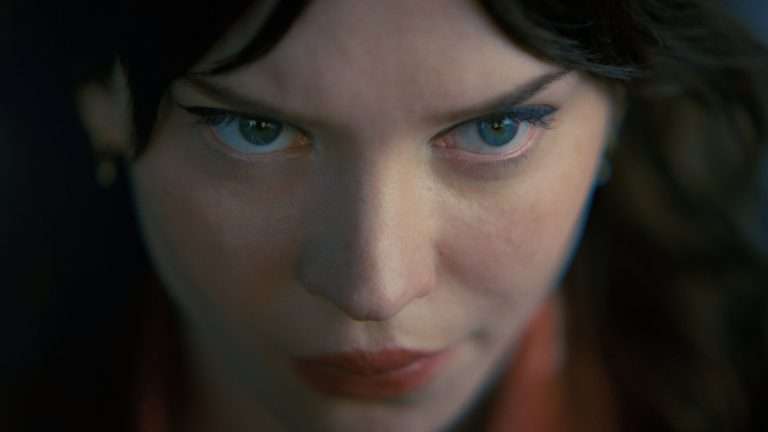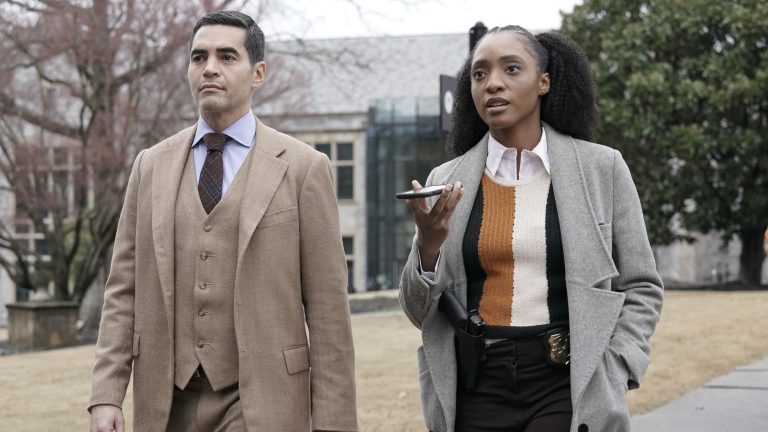Lessons in Chemistry Episode 5 (CH3COOH) Recap & Ending Explained: I think it is safe to start calling “Lessons in Chemistry” a lightweight period piece, where emotional quotients regarding social norms of that era are just brushed upon in favor of frothy and somewhat fanciful tellings of an era in the 1960s. Thankfully, while female empowerment is appreciated, what is even more appreciated in the case of “Lessons in Chemistry” is, at the very least, showcasing that empowerment is somewhat grounded against an environment predominantly misogynistic.
However, one also has to admit that the color palette, both in the fake kitchen of Elizabeth’s new television show as well as the color palette of the overall show, feels like young adult storytelling without utilizing the stereotypical young adult fantastical trappings. At the very least, it helps a viewer manage expectations of what a show is rather than what a show is expected to be.
Lessons in Chemistry Episode 5 Recap
Episode 5 – CH3COOH
The episode opens with the continuation of Dr. Mason’s advice to Elizabeth to join them in rowing for a healthy morning row, which would distract her from her troubles. As we see, she takes that advice to heart and looks at how capable she is at matching the pace with the rowing team. One can presume that she fits like a glove. We also learn that seven years from the time she decided to work on her research herself, Elizabeth started her own Tupperware system of sending customized lunches, and with the amount of Tupperware on the shelf, one can presume that Elizabeth’s business is going well. However, she is having a harder time continuing her research, perhaps because her spinning top technique isn’t as efficient as she had thought it to be.
Lessons in Chemistry episode 5 highlights the precociousness of Madeline, her hold on her vocabulary, and her intelligence beyond her years. While her questions about her father and his side of the family are justified, they are presented in a manner far different from the traditional precocious kids presented in television series. Elizabeth’s interactions outside the supermarket also highlight it after her shopping with her daughter has ended, where she meets a harried mother and two overexcited, rowdy kids. The lamentation of the mother with her wish of them at least setting the table remains unfulfilled.
The dinner that Zott and her daughter had been shopping for was the dinner with the Sloanes. Seven years later, Harriet has earned her law degree and become a lawyer, while James has gone back to regular practice. The two neighbors apparently have a pretty good relationship, considering they have been laughing about the proposition presented to her about hosting a TV show. But then Harriet informs her about the unopened letter from Philips Laboratory. It has been unopened because Elizabeth is already mentally prepared for being rejected.
However, in the presence of the Sloanes’ excitable company, Elizabeth learns that she has cracked the final round of the interview and will be able to get into the university, but only after giving the relevant references. The problem is that she has to get references from her prior place of work to get the job. As she takes that fateful decision to go back to Hopkins University and to her DNA lab, she learns that Dr. Donatti isn’t working there anymore, and the current head of the department is Boryewitz.
Perhaps this is how the book has been written, only from Elizabeth’s perspective. But the antagonism she faced within the first two episodes between Donatti and the members of the Mercer Grant Foundation in her interview already feels like it belongs in the rearview mirror. One of the problems with time jumps like these is that they test the connection the viewers might have with the individual character. For a character who is by design a closed-off character, it feels like the viewer has just started to know her before the show takes a curveball by using the entire perspective of “Six-Thirty” and then jumping seven years later.
It works in parallel that, however times progress, they remain the same, and that axiom works in the scene where Boryewitz, clearly far more confident after being the man in the chair, offers her old post as chemist back in her lab. However, she would have to work under Boryewitz, and she would be granted second authorship. That is a strict no from Elizabeth’s perspective because even from the beginning and especially after the passing of Evans, Elizabeth is determined to preserve her own identity, especially in whatever work she chooses to focus on. It also perhaps stems from her being a single mother and having to shoulder the responsibility of raising Mattie on her own.
However, her life’s curveball begins when she is called to Madeline’s office. She arrives there with the preconception that she will be chastised because of her daughter’s precocious nature, as prefaced by Madeline correctly discerning that humans are mammals, ergo animals. Instead, she is surprised to find the teacher suggesting that she should be sent to a private school as she is unable to be “challenged” here. She is also surprised by Madeline’s admission that she doesn’t like school. Back at home, Amanda (who we learn has befriended Madeline enough that they have their secret language) and Madeline are playing while Elizabeth is cooking dinner when she is visited by Walter, Amanda’s father.
Upon hearing Elizabeth describe why her chicken pot pie works better the next day, he is even more determined to pitch her their newest show. Walter and Elizabeth also bond over the fact that they are both single parents, even if, in the case of Walter, that is a result of divorce and his wife going on a trip to spiritual entanglement. The emotional core of this show always comes back to how much difficulty a person, especially a woman, would have to face, and she does it anyway, choosing to expand—a piece of advice passed down from Harriet Sloane to Elizabeth Zott to now Walter.
He finally tells her that he wants her to be a TV star because, even while understanding that she is intelligent, she doesn’t look down on people, and she treats everyone as her peers. When Elizabeth hesitates, Walter pitches in by saying that this show would be her responsibility, molded to her image. All of us who have any idea of how television works know that that is not exactly true, and we see Elizabeth, too, getting that lesson firsthand. What finally convicts Elizabeth is the payment, which, according to Walter, is more than “she would make.”

It’s fascinating how the working partnership between Walter and Elizabeth feels like the definition of an odd couple. Both Walter and Elizabeth have completely different energy and reactions regarding obstacles. When faced with the first inkling of an actual studio and the respect she would get, Elizabeth is pleasantly surprised. She is horrified and finds the set of her “kitchen” for the programme revolting, which had been created after being discussed by a focus group. The two of them discuss how to get to a middle ground, even digressing to Elizabeth’s marital status or lack thereof and how much love has played a vital role in the relationship between her and Evans.
Walter finally convinces her to look at this entire television show as an “experiment,” which Elizabeth takes seriously, as we see her watching night-time talk shows and game shows and jotting down all of the inflections of the game show hosts and complaining about how they smile too much (they did, and they still do).
At the very least, station head Phil is very happy about the very impractical costume that Elizabeth is wearing, and his inclinations are more in line with what traditional viewers would like to see: a “fuckable matronly figure” take over the afternoon television slot. But Phil is very much against the intelligence of that conversation from the host, especially when she talks about the “pH of chicken” or even basic chemistry being utilized in the kitchen. Thus, Phil is depicted as such a basic and outrageous version of a man, and Rainn Wilson is having a ball playing that version of a man, but it hits that point of managing expectations from a show whose antagonists are versions of men who are cartoons. Then again, that timeline of the 1960s helps to provide a suitable substrate for the exaggeration.
Thus, it is not a surprise that Walter unequivocally doesn’t take any of Phil’s suggestions into account but also points out to Elizabeth that she should make the show her own. Unlike Phil, Walter understands that the show needs Elizabeth unfiltered; her personality needs to shine through. Thus, when the show has to run two weeks ahead of schedule (the reality of this show is incredibly exaggerated and, at times, preposterous), she has to be herself and show all the facets of herself, not the scientist. Her catchphrase, “Children, set the table. Your mother needs a moment”, feels earned because it encapsulates the logic and the empathy simultaneously existing within Elizabeth’s character.
The problem, at least, is with Phil, who is livid at the focus group that calls the show boring, and her presence is saddening, leaving the viewers feeling they are being punished. The reality is that those perspectives are only the male ones; the female ones are being drowned out. Ironic that a show dedicated to an afternoon audience, specifically catered to a female audience, and later shifted towards night has a focus group mainly focused on the male voice, but then again, that’s the blatant irony of showbiz, which does exist even now.
As a result, the women are being drowned out. Who would voice out Elizabeth’s performance as one of capability? Thus, when Phil states that after a long, hard day of work, a man is supposed to be fed and relaxed by his woman with a long glass of drink, she hits back by asking why he would think that her day wouldn’t be any bit longer than his or harder? As it stands, phones start chiming on the helpline number about the details of the compound or acetic acid, which gives this episode its name, and Elizabeth points out that it is acetic acid. Thus, “Supper at Six” is an instant hit.
Lessons in Chemistry Episode 5 (CH3COOH) Ending Explained
This newfound fame, however, puts a dampener on the life of Madeline Zott. Already feeling upended by the change in her school and her mother’s new job as a super popular TV host, leaving less time for them to hang out, Madd Zott chooses to focus on discovering more about her father. Alone at her house and ignoring her mother’s instructions on how to spend her afternoon, Mad chooses to explore the office and go through Calvin’s things. There, she finds a couple of Calvin’s demerits, and she stuffs them in her pocket when hurrying to go with her babysitter to her choir practice at church.
At that choir practice, Mad strikes up a conversation with Reverend Wakely, who takes an immediate liking to her due to her precociousness, especially when she reminisces about how she misses something, especially the feeling of someone she hasn’t actually met. Wakely looks at the demerits Mad shows him and points out that the emblem has a very remarkable blue color, which could only match one school, St. Luke’s. So Calvin must have gone to one of St. Luke’s schools, and the next time Wakely meets up with Mad, he gives her a list of all the St. Luke’s schools he could find across the country in the Yellow Pages. This spurs on to bring out the inner detective within her and find out about her father, something more than him being her mother’s favorite person before she came into his life.
For Mad, however, that moniker is also beginning to feel under contention because that newfound fame will take some getting used to. One night, when Elizabeth comes home late from the studio, and they go to a diner to have dinner, Mad begins to regale stories about her day to her mother, except she is interrupted by a waitress who recognizes her and is clearly inspired by her deadpan zingers that she has taken to heart about “rising to the occasion.” The problem is clearly that Elizabeth’s rise to fame will need some time adjusting for the Zott ladies.









